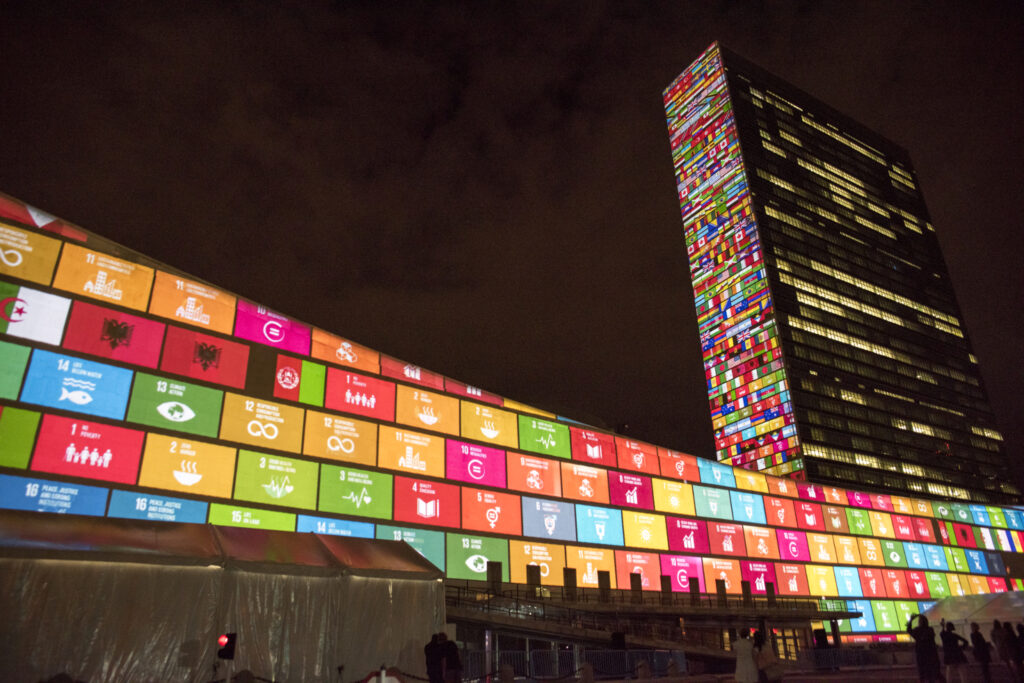As politicians and policymakers prepare to address the United Nations during a high-level summit to assess the lack of progress on the 2030 Agenda and the Sustainable Development Goals (SDGs), a diverse group of activists and community leaders representing some of the world’s most marginalized communities are gathering just across from the UN Headquarters in New York. Their mission is to spotlight governments’ failures and present concrete solutions to the poverty and environmental catastrophes afflicting the planet.
More than 500 activists have convened for the Global People’s Assembly, a two-day event held on September 17th and 18th, which is the culmination of a series of national-level assemblies, regional gatherings, and thousands of decentralized, local actions, according to a press release. The event is coordinated by the Global Call to Action Against Poverty (GCAP), with the support of over 60 organizations, including Amnesty International, CIVICUS, Greenpeace, Oxfam International, and Save the Children. The assembly will address critical issues such as social protection, human rights, the feminist economy, peace and conflicts, biodiversity loss, and climate financing.
Lack of Progress on SDGs
As the world marks the halfway point toward achieving the SDGs, adopted in 2015 to end poverty, reduce inequalities, and promote environmental sustainability, the United Nations estimates that only 12 percent of the targets are currently on track. More alarmingly, 30 percent of the indicators are actually worse now than they were eight years ago.
« The debt crisis is killing the SDGs, » warned GCAP Director Ingo Ritz. « Financial systems, dominated by rich western nations, are not creating global prosperity. We need new solutions, starting with debt cancellation and new funding that enable communities to achieve the Sustainable Development Goals without creating new debt traps. We strongly believe that the world can change for the better if leaders listen to people’s voices and concerns, rather than racing to protect the interests of the affluent. We must move beyond empty rhetoric and prioritize concrete actions to implement the SDGs. »
Currently, sixty countries are grappling with debt crises as interest rates skyrocket. Austerity programs, which disproportionately affect impoverished and marginalized communities, have been implemented in many countries as they struggle to meet their international debt obligations.
A Call for Meaningful Change
« The world is facing massive challenges, but too many governments are choosing to crack down on the rights of their people and civil society rather than bringing about meaningful change, » remarked CIVICUS Secretary-General Lysa John. « It is essential to hear diverse voices and ensure that the concerns of those who face discrimination are addressed. The world is way off track. Alarm bells are sounding. Now is the time for a new generation of leaders to step up and turn the tide of action to achieve the promise of the SDGs. »
Blueprint for Global Justice
In response to these pressing challenges, the Global People’s Assembly has issued a call to action to global leaders. They demand a clear path to achieve Agenda 2030 and the SDGs, starting with a solution for the debt crisis, including a reform of the international financial architecture, and a concrete agreement to establish social protection floors for all by 2030. Development and climate financing must be implemented in a manner that does not increase the debts of countries and communities striving to achieve the SDGs.
Mads Flarup Christensen, Executive Director of Greenpeace International, emphasized the importance of climate justice, stating, « As part of the Global People’s Assembly, we stand with those on the frontlines of the climate emergency and demand a new deal that delivers justice for people and the planet. The fossil fuel industry is keeping the world dependent on a failed energy system. Climate justice means an urgent fossil fuel phase-out and making polluters pay for the loss and damage their decisions have caused. »
Inclusive Development Efforts
The Global People’s Assembly underscores the significance of local participation and the inclusion of communities that have traditionally been left at the periphery, such as indigenous groups, LGBTQI+ individuals, communities discriminated by work and descent (CDWD), and people with disabilities. They believe that sustainable development is a collective effort, emphasizing the role of grassroots organizations, community leaders, social movements, and citizen expression in societal progress.
As the Global People’s Assembly convenes to address these pressing global issues, it sends a powerful message to governments and leaders worldwide: the world is watching, and the time for meaningful action on the SDGs is now. The assembly represents a diverse and passionate group determined to hold leaders accountable and work collaboratively toward a more just and sustainable future for all.




